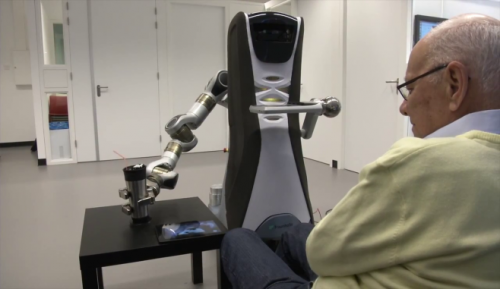Researchers develop prototype of a robotic system with emotion and memory (w/ Video)

Researchers at the University of Hertfordshire have developed a prototype of a social robot which supports independent living for the elderly, working in partnership with their relatives or carers.
The robot uses a state of the art service platform called Care-O-bot 3 and works within a smart-home environment.
Dr Farshid Amirabdollahian, a senior lecturer in Adaptive Systems at the University, led a team of nine partner institutions from across five European countries as part of the €4,825,492 project called ACCOMPANY (Acceptable Robotics Companions for Ageing Years).
Over the past three years the project team successfully carried out a wide range of studies in the University's Robot House which included, detecting the activity and status of people in a smart-home environment as well as focusing on robots' ability to remember and recall.
Developments culminated into three interaction scenarios, which were subsequently evaluated by involving elderly people and their formal/informal carers across France, the Netherlands and the UK.
ACCOMPANY's results demonstrated that a social robot can potentially help to prevent isolation and loneliness, offering stimulating activities whilst respecting autonomy and independence. The project received "excellent results" from its final review in Brussels.
Dr Amirabdollahian said: "This project proved the feasibility of having companion technology, while also highlighting different important aspects such as empathy, emotion, social intelligence as well as ethics and its norm surrounding technology for independent living."
More information: For more information, see accompanyproject.eu/.
Provided by University of Hertfordshire




















